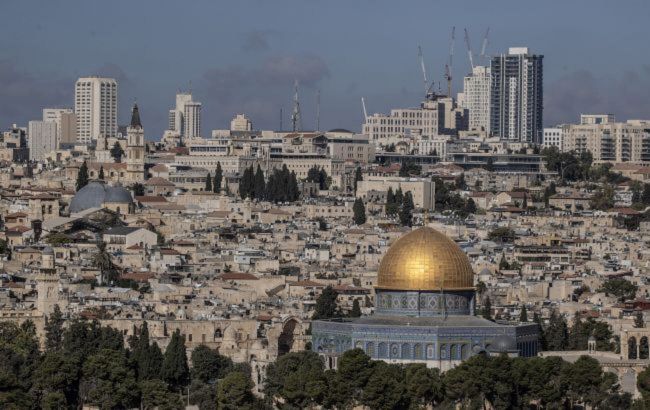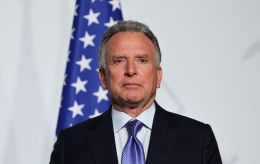Israel launches construction of settlement to 'bury' idea of Palestinian state
 Illustrative photo: Panoramic view of Jerusalem (Getty Images)
Illustrative photo: Panoramic view of Jerusalem (Getty Images)
Israeli Finance Minister Bezalel Smotrich announced the start of construction of a settlement that will divide the West Bank and cut it off from East Jerusalem, blocking the creation of a Palestinian state, according to Reuters.
Israeli Finance Minister Bezalel Smotrich said construction will begin on Wednesday, August 20.
On Thursday, August 14, during a visit to the site of the planned settlement in Ma’ale Adumim, Smotrich stated that Prime Minister Benjamin Netanyahu and US President Donald Trump had agreed to revive the E1 development project. However, neither leader has made any official announcement on the matter.
"Whoever in the world is trying to recognise a Palestinian state today will receive our answer on the ground. Not with documents nor with decisions or statements, but with facts. Facts of houses, facts of neighbourhoods," Smotrich said.
In a statement titled "Burying the idea of a Palestinian state," his spokesperson said the finance minister had approved plans to build 3,401 homes for Israeli settlers between an existing West Bank settlement and the city of Jerusalem.
In response, a US State Department spokesperson said that "a stable West Bank keeps Israel secure and is in line with this administration's goal to achieve peace in the region." He added that Washington is currently focused primarily on ending the war in the Gaza Strip.
Accelerated construction
The group Peace Now, which monitors settlement activity in the West Bank, said several steps remain before construction can begin, but infrastructure work could start within months and housing construction in about a year.
"The E1 plan is deadly for the future of Israel and for any chance of achieving a peaceful two-state solution. We are standing at the edge of an abyss, and the government is driving us forward at full speed," Peace Now said in a statement.
According to the human rights group Yesh Din, Israeli governments have consistently initiated, approved, planned, and financed settlement construction.
Some settlers have moved to the West Bank for religious or ideological reasons, while others were drawn by lower housing costs and government incentives. Among them are US and European citizens with dual nationality.
Shattered hopes for peace
The Palestinian government, its allies, and human rights organizations condemned the plan as illegal, stressing that fragmenting the territory would destroy peace initiatives.
Palestinian presidential spokesperson Nabil Abu Rudeineh urged the US to pressure Israel to halt settlement construction. The UN also called on Israel to cancel the decision.
"It would put an end to prospects of a two-state solution," UN spokesperson Stephane Dujarric told reporters. "Settlements go against international law … (and) further entrench the occupation."
Breaking the Silence, an Israeli rights group established by former Israeli soldiers, said what it called a land grab "will not only further fragment the Palestinian territory, but will further entrench apartheid".
European Commission spokesperson Anitta Hipper said the EU rejects any territorial changes not agreed as part of a political settlement, stressing that "annexation of territory is illegal under international law."
UK Foreign Secretary David Lammy said the plan must be stopped, calling it a gross violation of international law.
Implications for Israel
Israel froze the Ma’ale Adumim building plans in 2012. Construction resumed in 2020 but was later halted due to objections from the US, European allies, and others who saw the project as a threat to any future peace agreement with the Palestinians.
Reuters notes that reviving the project could further isolate Israel, which is already facing criticism from some Western allies over its military campaign in Gaza, allies who have signaled they may recognize a Palestinian state.
Palestinians fear that settlement expansion in the West Bank, which intensified after the October 2023 Hamas attack and the start of the Gaza war, will strip them of the chance to establish their state in the territory.
Most world leaders say settlement expansion has destroyed the viability of a two-state solution by fragmenting Palestinian lands. The plan envisions a Palestinian state in East Jerusalem, the West Bank, and Gaza, existing alongside Israel.
Israel cites historical and biblical ties to the region and claims settlements provide strategic depth and security.
Most world leaders consider all settlements illegal under international law. Israel rejects this, calling the West Bank "disputed" rather than "occupied" territory.
In June, the UK, Canada, Australia, and New Zealand imposed sanctions on Smotrich and another far-right minister who supports settlement expansion, accusing them of repeatedly inciting violence against Palestinians in the West Bank.
Recognition of Palestinian state
In late July, French President Emmanuel Macron announced plans to recognize an independent Palestinian state at the UN General Assembly’s autumn session. Israel and the US strongly criticized the move.
UK Prime Minister Keir Starmer has not ruled out recognition, and Australia also intends to recognize Palestine at the UN this autumn.
Read more about the intentions of several Western countries to recognize the Palestinian state in RBC-Ukraine’s analytical article.

